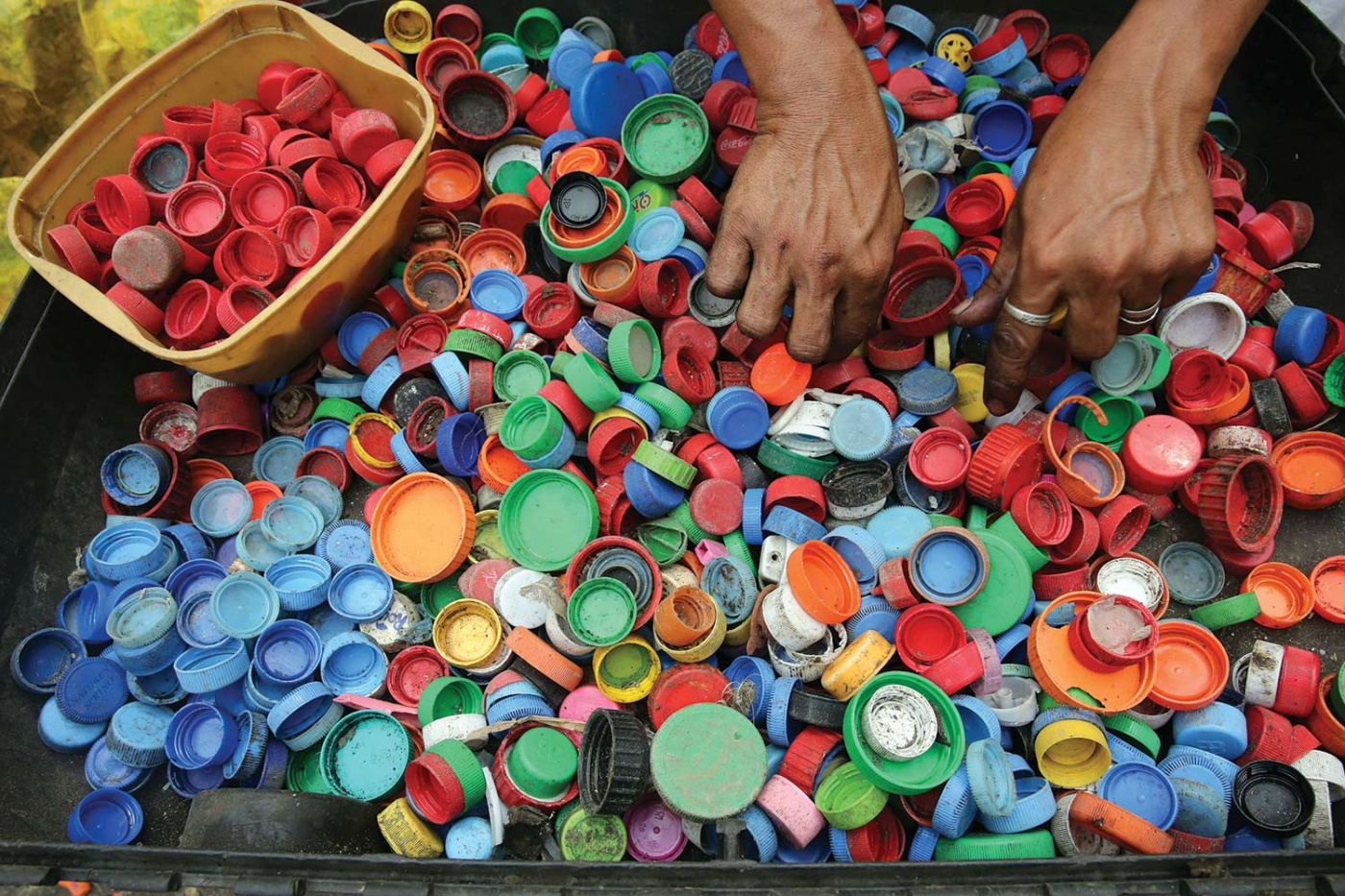Trash Talking The Plastics Ban
For all the things we would agree to disagree on this week and the 10th anniversary of the Bear Stearns bailout, we have a record US$ 43.3 bio pumped into US equity ETFs this week that also coincides with the largest weekly stock buybacks in history as not a single Japanese 10 year bond traded on Tuesday after the BoJ admitted they bought 75% of all JGBs issued in 2017, not worried that US Libor rates are back to 2008 levels with the US budget deficit at its largest since 2012.
Would we welcome in unison the decision of the second largest Indian state, Maharashtra, home to the 10th largest city in the world—Mumbai, to ban plastic starting 18th March, on Gudi Padwa, the Indian new year?
It is ironic that just last week, we got into a minor disagreement over an otherwise friendly lunch with an old friend who had snorted at our attempt to carry away from the cafe our disposable plastic cup used for water, to be recycled. His argument was that he could afford to waste 2 cups because he did not drive. We agreed to disagree.
On the other extreme, we have a dear friend gone rogue on her environmental bent, developing a habit of involuntarily picking up clean-ish trash from the streets to be binned, attracting the odd stare as she rants about dead fishes in the Singapore river swaddled with all sorts of plastic ware. Food packaging has affected her choices for takeaway lunches as the poor thing picks the sandwich and wrap over laksa. We agree to disagree.
Nonetheless, we have been in the eco-camp for some years now since we picked plastic litter from the uninhabited shores of the Arctic that were strewn in garbage, washed up by the Gulf Stream and we learn something new every other day, reading up on the “fat-bergs” in the sewers of England that are 93% wet wipes (containing microplastics) and thinking surely, the collapse of the Polar Vortex that is leading to the freak weather events around the world could be helped if the 7 billion human inhabitants of the world changed their lifestyles.
With the Indian ban set to take effect immediately after Taiwan plans to start their ban from next year and Kenya’s ban last year, there is no better time than to put some of our extensive thoughts to paper and writing this will be easier than ever because it is a subject dear to our hearts but a tall order at the same time, given the extensive amount of information across several topics to condense into a sensible post with investment suggestions and ideas for the future.
The Anti-Plastic Propaganda
More reasons emerge to hate plastic this week after the mighty headlines from CNBC and the Straits Times on the findings that 93% of 259 brands of bottled water were tested positive for microplastic contamination—an average of 10.4 plastic particles per litre, implicating even well-known (expensive) brands from Aquafina to San Pellegrino. 10.4 particles is roughly twice of what is in tap water, for yes, plastic has been found in tap water, along with chemicals and drugs and all the other things they found over the years.
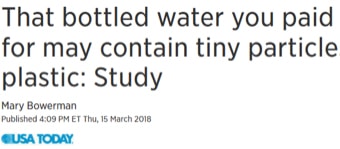 Source: CNBC
Source: CNBC
It should come as no surprise after last year’s findings that a third of fish caught in UK waters contain plastic in their flesh.
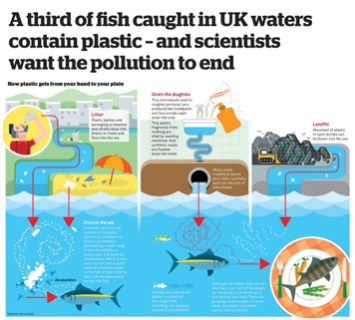 Source: iNews
Source: iNews
Asian waters could be in worse shape as we watch in revulsion some shocking dive trips posted online of divers struggling to swim through plastic waste in the sea – plastic that eventually gets pummelled by the tides into tiny bits of delectable lookalike “fish-food”.
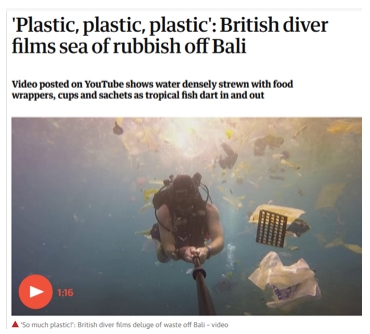 Bali Waters, Source: The Guardian
Bali Waters, Source: The Guardian
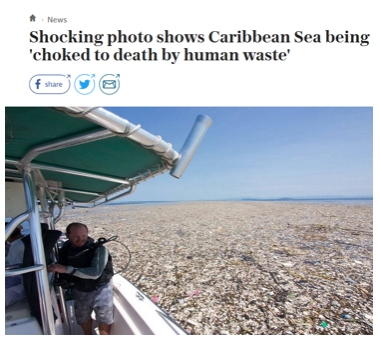 The Caribbean Sea, Source: The Telegraph
The Caribbean Sea, Source: The Telegraph
Religion is getting involved as the Church of England wants folks to reduce or give up on plastic waste for Lent in a “Lent Plastic Challenge”.
The Queen of England is also taking the lead with a £369 million overhaul of the Buckingham Palace, banning plastic and reducing the Royal household’s carbon footprint.
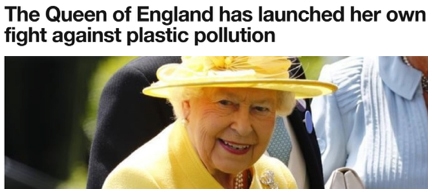 Source: WEF
Source: WEF
But… Plastic is in The Air that We Breathe
Microbeads died a quiet death for all the innocent fun we had with them in our lives—in those body washes, laundry and dish detergents. Phased out in most of the western world since 2017, the plastic derivative will be one less problem for the fishes even as birth control pills are causing male fish to mutate into females.
Yet, plastic is in the air that we breathe daily and features in the food chain. A study showed a rain of microplastics falling on Paris, dumping 3 to 10 tonnes a year on the city. The microplastics filtered from water treatment plants are ploughed back into farmland for “plant food”.
Microplastics have been found in German bottled beer, sugar and honey besides the animals, fishes and plants.
The WEF listed 10 other sources of microplastics in our daily lives (besides the wet-wipes that we are not religiously binning instead of flushing)—car tyres, synthetic clothing, tennis balls, laundry tablets, cigarette butts, glitter, tea bags, paint dust and takeaway cups.
If we are breathing plastic and it is raining plastic, does that make the plastic particles in bottled water seem more palatable?
Or perhaps, as a dear friend of ours suggested, we will surely be plastically embalmed in our deaths?
Why The Sudden Interest in Plastic?
We would like to think it was the dying whale with 30 plastic bags in stomach story last year that got this global rush to the plastic-ban bandwagon.
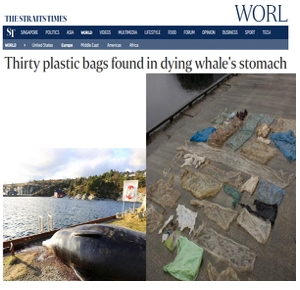 Source: ST
Source: ST
In the past 3 days, besides Maharashtra, we have Scotland banning straws, Malibu banning straw, bags and styrofoam containers and France banning plastic straws and cutlery, as Taiwan announced last month their anti-plastic campaign will start next year.
Global corporations like Diageo and Pernod Ricard have already enforced a ban on plastic stirrers and straws earlier this year.
Perhaps it is just recognition of the larger economic and social problem that is caused by China banning the import of recyclable plastics on 1 Jan 2018.
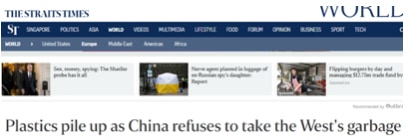 Source: ST
Source: ST
Therein lies the bigger problem and the message to the rest of the world to manage their plastic waste because the Chinese were not interested in eating plastic-in-their-vegetables.
It is just too bad that 1 Jan 2018 comes after the heaviest online shopping season for the world and we all know that online shopping generates excessive packaging waste, primarily in plastic wrappings and paper cartons.
Rubbish Stats—Singaporeans Waste
The biggest household waste in sunny Singapore originates from plastics, paper and food.
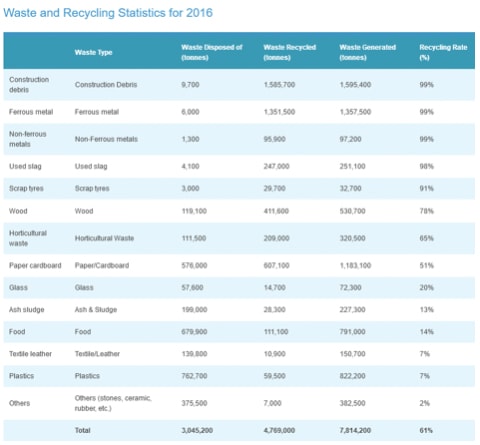 Source: NEA website
Source: NEA website
We decided to take a look at how much waste is attributed to each member of the estimated resident population, babies and non-Singaporeans included.
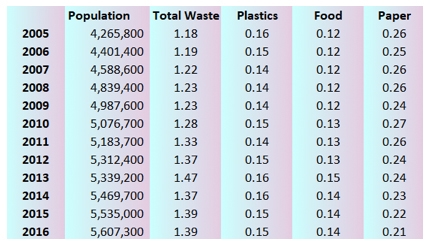 Waste per person per annum in metric tonnes; Source: NEA website
Waste per person per annum in metric tonnes; Source: NEA website
*Total Waste includes construction waste & metals waste which is 99% recycled.
We waste 140 kg of food a year and produce 150 kg of plastic waste per living resident.
Let us take a look at the recycling rates for these 3 big sources of waste and express our surprise that plastic recycling has fallen over the years due to lower recycled volumes which meant the rest was burnt.
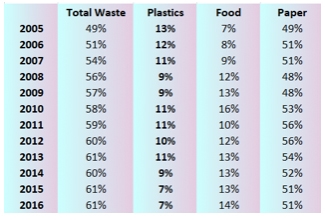 Recycling rates for waste; Source: NEA
Recycling rates for waste; Source: NEA
It is also worth noting, that for land-scarce Singapore, just 21% of recycling is done domestically which suggests that Singapore exports waste to other countries to be recycled. And while a palpable defense would be that Singapore produces much less waste per capita compared to the other developed countries and boasts of the second highest reported recycling rate in the world, environmental consultancy, Eunomia, downgraded Singapore to tenth place in the municipal waste recycling race, by their standards, almost halving Singapore’s reported 61% to 34%, well under South Korea (and we do not know why Japan is not in there).
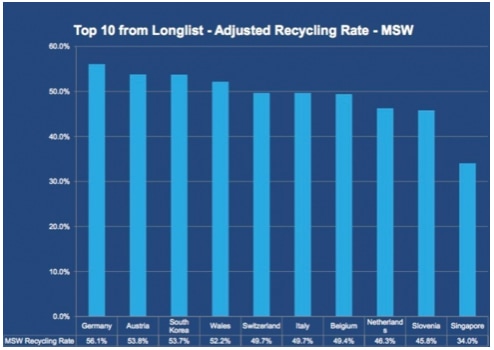 Source: WEF
Source: WEF
It is lucky that burning our plastic waste was discounted from the numbers as well but we can also thank the new Freegan “dumpster diving” movement if 2017’s food waste numbers drop.
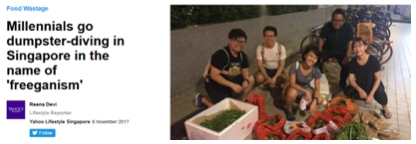 Source: Yahoo
Source: Yahoo
At the same time, we can only expect Germans to recycle a lot more because their trash is only collected once a week!
Singapore Will Take Action
Our antennae are on alert, the pace of the rhetoric in the papers has been grown, “sustainable smart city”, “carbon taxes” in the recent 2018 Budget, “Singaporeans are using too many straws”…
In the past, we could have doubted the sincerity of the government, choosing to keep Styrofoam containers on our menu when Taiwan completed her Styrofoam ban in 2015. Singapore has heart for the hawkers and food service providers, at least.
Others complain that it still costs a hefty 6 figure amount to solar panel their residential homes without any state subsidies but we think it is fair enough for a population of which 80% live in public housing for the landed homes can jolly well pay for their solar panels themselves.
The signs that Singapore will be taking action soon (but not as soon as Maharashtra) are all there and Singapore will be giving advance notice like the GST expectation in 2021 because India prefers chaos like their sudden demonetisation and ban on 500 and 1,000 rupees back in 2016.
The straws will come first and then takeaway cups and then the plastic bags and all those items that are not in the NEA list of recyclables and we would take this opportunity to say we are disappointed toothbrushes (recyclable in many parts of the world) are not found on the list.
 Source: NEA list of items that are recyclable and not
Source: NEA list of items that are recyclable and not
It is not particularly difficult as a plastic-free Welsh village found out recently – paper straws, biodegradable cups, wooden cutlery, glass bottles and all.

Source: Mirror
Trade Idea: Buy wood companies, paper companies, Sell plastic producers?
The bigger problem is the cost—the cost that consumers have come to take for granted but can no longer afford to especially with the higher water and electricity tariffs.
The Changes We Can Expect
After those microplastic in the water news, we will take on any bet against a sharp spike in the global sales of ion-exchange water filters! 3 cheers for the trusty one at home!
For some of us who have lived in Australia and dealt with their toilet paper prices (that was more than tempered by their dairy and fresh produce prices), Singapore is a great place to live if you use over a yard each time you visit the lavatory, like some people we know.
Future plastic bans will no doubt result in changes to society and the economy in changing consumer behaviour and the business landscape.
The cost of business will undoubtedly go up from here and the companies best equipped to deal with the cost increases would be those with scale which means smaller operators will lose out. Food court chains, supermarket chains and retail chains will out do their smaller competitors and there will be an upheaval in the food delivery and catering business.
Bets are on for those listed chains!
Yet, at the same time, our dear “clean trash” picker friend may start eating from BreadTalk again, if they stopped using plastic bags just as the Welsh storekeeper has seen sales increase since he started selling milk in glass bottles.
We can only expect Singaporeans to complain their hearts out on any sign of price increases and true to the Singapore kiasu spirit, they will only embrace the anti-plastic movement with fervor especially after Mediacorp runs BBC’s Blue Planet a couple of rounds on free-to-air TV.
The longer-term impact would be the consumer awareness that this plastic ban would create, the environmental awareness that is not good for rampant consumerism that has been driving global growth and slow down the embracing of new tech devices.
Forgive our plastic heads, how did a discussion on plastic bags and cups come to this conclusion?
We will leave the rest of our rant on climate change, debunking climate change, preparing for climate change and investing for climate change next week.
